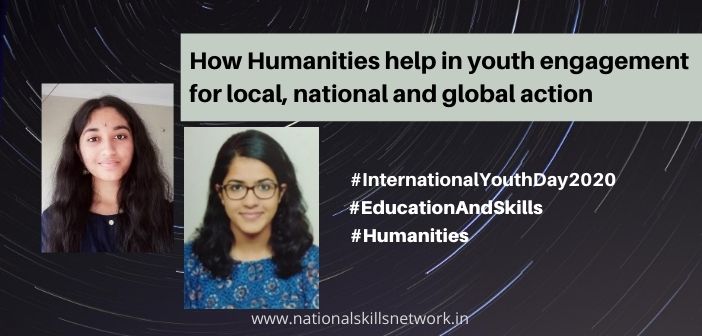How does change begin? What causes it? Who makes it happen? When does it make a difference? Delving deeper into these questions Samhitha Madhunapanthula and Shreya Mishra, young Humanities enthusiasts, express their views on the occasion of International Youth Day 2020. Let’s understand how Humanities help youth engagement for action.
Change begins with awareness!
“A brave, frank, clean-hearted, courageous and aspiring youth is the only foundation on which the future of the nation can be built on” – Swami Vivekananda
Every year, 12th August Is celebrated as International Youth Day. The United Nations has marked this day to recognize the talent and efforts of youth and in promoting unity and creating an equitable world. This year, the United Nations has decided to focus on how youth can engage in making a change in three levels: local/community, national and global.
International Youth Day 2020, “Youth Engagement for Global Action”
The theme of International Youth Day 2020, “Youth Engagement for Global Action” focuses on how young people can engage with several organizations, institutions and process at local, national and global levels. This gives them an opportunity to explore issues related to economic development, environment protection, human rights, gender inclusivity and others that are deeply rooted in human behaviour.
Some great examples of young leaders who influenced global action are: Greta Thunberg, Ridhima Pandey (climate change); Malala Yousafzai (women’s right to education); Iqbal Masih (Child Labour, Children’s Rights) and Sophie Cruz (Immigration Reform Advocate).
So, what makes them take action?
Malala Yousafzai, Nobel Peace prize winner talks about how her personal experiences led to her actions in her book ‘I Am Malala’.
Most of the young leaders wanted to bring this change because they directly experienced and witnessed certain situations which had a negative effect on them. Some of them become aware through media, reading and education, making them empathize with these issues.
 How interdisciplinary education plays an important role in creating awareness
How interdisciplinary education plays an important role in creating awareness
All these leaders have one thing in common, that’s awareness and the will power to take action. Today, when we talk about involving youth for action at different levels, we need to help them understand various issues, learn and be aware of implications for a sustainable living. Subjects like Political Science, History, Anthropology, Language and Literature, Journalism and Mass Communication, Economics, Psychology, Law, Philosophy, Environment etc open new avenues to learn, discover and address many issues.
Humanities inculcates awareness along with the necessary knowledge and skills to take action. It allows us to contribute to our moral, historical, and political awareness and engage in healthy discussions and meaningful action. Interdisciplinary education can help one become aware, but only awareness cannot help take action to make a difference.
Humanities enables one to have a connection with the world and the people. It helps to look at these issues with empathy and sensitivity. This is exactly what is needed to be able to make a change.
How Humanities help in local, national and global engagement
With diversity of thoughts and ideas from the humanities subjects, it is easier to understand people. We can relate to human experience and analyse with respect to a particular domain, like politics or environment. One example for this is the latest Environmental Impact Assessment (EIA) 2020. When the draft was released, today’s youth sent emails to certain authorities in attempts to request a reissue of the draft.
How could humanities come into the picture? If a student has a background of Political Science, History and Environmental Science, they could have a better insight as they are aware of:
- how human-environment relationship changed over time
- the rights an individual has to influence the decision of the state
- the red flags in the draft which aren’t visible to one without knowledge on the subject
This awareness and sensitivity comes from honing the ability to put together theories and solutions from these different subjects. This doesn’t apply to those who interpret just within the humanities but also to the people who interpret different disciplines along with humanities, like STEM. This allows an individual to be able to identify and solve all sorts of issues.
Related article: 10 points to consider: Vocational education and skills in National Education Policy 2020 – Read more: https://nationalskillsnetwork.in/10-points-to-consider-vocational-education-and-skills-in-national-education-policy-2020/
Skills derived from Humanities influence our actions
Skills that have been derived from studying the humanities subjects directly influence the youths’ actions. Communication Skills, Empathy, Adaptability and Critical Thinking are the major skills we see in leaders who are able to leave a mark.
Taking all this into consideration, today’s youth has the determination, concern and sensitivity to change the world. They voice their opinion on different social media platforms, this reaches out to more people and gives a different perspective than what is heard on the news. They organise protests, rallies and set up non-profit organizations. The youth are more aware of their rights, their capabilities and make the best use of their resources. Today’s world is a great example for that.
You can also be this change. You can stand up. Just like they did.













Comments 2